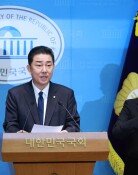Hiddink All Too Aware of Englands Achilles Heel
Hiddink All Too Aware of Englands Achilles Heel
Posted October. 27, 2007 03:08,
Englands Premier League is touted to stand atop the highest echelon of the worlds professional football leagues. Why, then, is Englands national team not receiving similar recognition in its respective competitions? The question provides its own answer. The best professional league stands on its prowess in the recruitment of the best footballers from around the world. While its black hole-like attraction draws in the cream of the crop among football talents, the downside to the Premier Leagues indiscriminate magnetism robs Englands very own nationals of preferential spotlight that other national team members are often beneficiaries of.
Why, England features only the best of the best individual talents in the likes of Wayne Rooney, Steven Gerrard, Michael Owen, Joe Cole, John Terry, and Rio Ferdinand. But an assemblage so solid as this succumbs in matches against teams of inferior constituents, as shown in its recent clash against Russia. What is inherently wrong with this picture?
One solution to Englands national teams current woes that comes to mind is Guus Hiddink. The Dutch, Korean and Aussie squads were beneficiaries of his managerial genius. Currently with the Russians, Hiddink is doing his accustomed self-P.R. by blowing away all or any remaining doubters of his results.
The fact that Hiddink may have just as easily been at the helm in England in lieu of Russia must agitate any sincere fans of English football. The England Football Association let go of their chance to summon his services when they had it in 2006, just before the World Cup competition in Germany. Naturally, Hiddink found himself working for much more active a suitor nation in Russia and developed his new squad toward their latest victory over England.
Firstly, Hiddink knows Englands players all too well and is aware of their defensive lines disproportionately weak corners. The Russians therefore had a field day in dissecting this often overlooked weakness of the England team.
Secondly, against Hiddinks strategic brilliance, England manager Steve McClaren is under the spotlight for a strategic formula described as both passive and ineffective. His former manager role at Middlesbrough speaks for itself. Much of his Premier League squads lackluster games were marked by low-scoring and tied-games. McClarens overall performance is unquestionably unimpressive in juxtaposed comparison with the glows of Hiddinks winning mentality and production. Insiders of English football describe the formers passivity as zapping the aggressive energy of national team members.
For instance, Wayne Rooney of Manchester United is just not the same player on the national team. His support crew of Cristiano Ronaldo, Ryan Giggs, Carlos Tevez, Louis Saha, and Paul Scholes sufficiently allow his comfortable plays on the professional team. In comparison, Rooney finds himself trying to do too much on his own when he plays for the national team. Against Russia, he voided his own scored goal by drawing a Russian penalty kick.
Four days after the defeat to the Russians, Liverpool manager Rafa Benitez took away Steven Gerrards captains-brassard to a league debutante from Brazil, Lucas Leiva. In his interview, Benitez explained, At certain points in the game where a calm, leadership mentality was critically needed, Gerrards running perhaps outnumbered his passes too much.
The English national team, with Gerrard at the forefront as its captain, was no different in the game at Moscow. Emotions got the better of the players and Hiddink and Benitez were likeminded in noticing something so obvious.
ROBHU800@aol.com



![‘건강 지킴이’ 당근, 효능 높이는 섭취법[정세연의 음식처방]](https://dimg.donga.com/c/138/175/90/1/wps/NEWS/IMAGE/2026/01/18/133181291.1.jpg)



